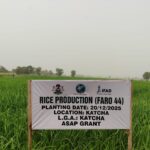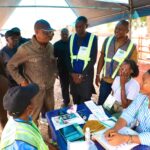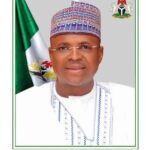By Felicia Imohimi
The Farmers Aggregators Initiative of Nigeria (FAIN), an NGO, and other stakeholders have called for a comprehensive review of existing gender policies and laws on agricultural export.
They made the call at a summit on Mainstreaming Gender in Agriculture organised by FAIN in Abuja.
The theme of the summit is “Mainstreaming Gender into the Agricultural Sector for Women and Youth Empowerment: Developing a Roadmap for Understanding Gender Policy and Export Trade in Line with the Sustainable Development Goals (SDGs).’’
Mr Cornelius Agenyi, Chief Executive Officer, FAIN, said the summit was aimed at enhancing gender mainstreaming within agriculture by promoting the active participation of women and youths, addressing vital sectoral issues and contributing to the fight against food insecurity.
Agenyi called for the collaboration of government, international organisations and private sector to ensure that gender-sensitive policies were not just in place but effectively implemented.
He specifically urged them to prioritise land rights, access to finance and equal representation in leadership roles.
According to him, the summit will also provide a platform for exchanging knowledge, sharing experiences and discussing best practices.
He said that FAIN was committed to empowering women and youth through modern agricultural practices that fostered sustainable livelihoods, thereby aligning with SDGs 1, 2 and 5.
Agenyi said that the initiative collaborated with more than 41 MDAs and government agencies and was endorsed by the Federal Ministry of Agriculture and Food Security as well as the Federal Ministry of Women Affairs and Social Development.
“Mainstreaming gender was more than just a policy, but a mindset, an approach that seeks to remove barriers and create an environment where both women and men could contribute equitably to agricultural development.
“Incorporating gender perspectives in agricultural business is not only a matter of justice; it is a strategic economic move.
“Studies have shown that when women have equal access to resources; they invest their earnings in their families, communities and economy, fostering greater growth and development.
“By empowering women in agriculture, we unlock untapped potential that drives productivity, innovation and sustainable development,” he said.
Col. Abdulmumini Aminu(retired), Chairman, Board of Trustees, FAIN, called for decisive actions towards visible support for Nigerian women to succeed in agricultural sector.
Aminu, who was represented by Mrs Modupe Jemibewon, Secretary to the board, identified funding as a major challenge to efforts in boosting women farmers’ participation in agriculture.
He, however, urged President Bola Tinubu to take up the challenge of maintaining gender into agricultural business in line with the renewed hope agenda.
Mrs Folashade Joseph, Managing Director, Nigeria Agricultural Insurance Corporation (NAIC), identified women as indispensable to achieving food security, yet their potential remained underutilised due to systemic barriers.
According to her, empowering women societies can only be achieved by improving food security and addressing broader goals of poverty reduction, gender equality and sustainable development.
She listed some objective areas towards SDGs as improved or enhanced stakeholders understanding of gender policies and their impact on agriculture and export trade as well as promoting gender equality and increased women participation.
Joseph, however, said there was need to conduct a comprehensive review of existing gender policies and laws relating to agriculture and trade.
“In viewing gender policy, there is need for stakeholders’ engagement including government officials, farmers, exporters, women and youth to raise awareness and gather input; to provide tracing and capacity building programmes for stakeholders on gender sensitive agriculture and export trade practices,” she said.(NAN)(www.nannews.ng)
Edited by Chijioke Okoronkwo












